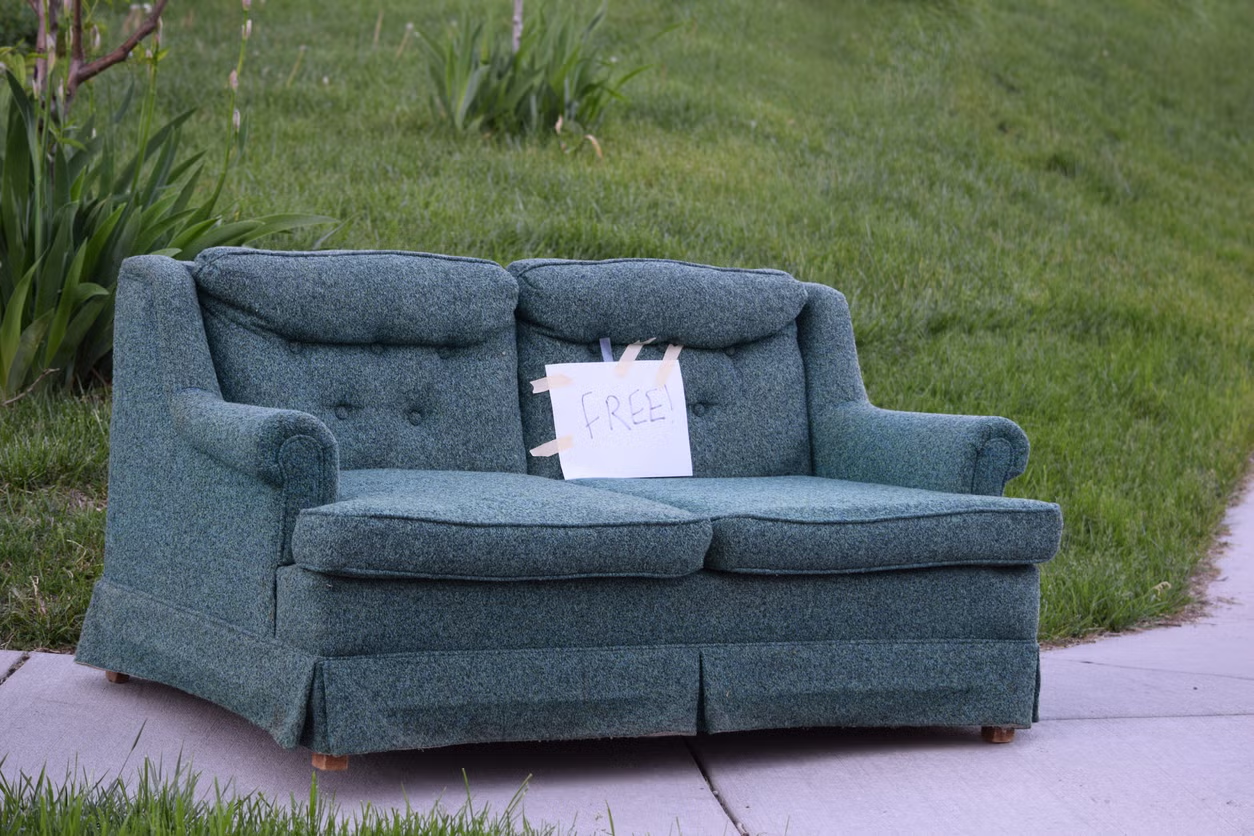Your support helps us to tell the story
Support NowMy recent work focusing on Latino voters in Arizona has shown me how crucial independent journalism is in giving voice to underrepresented communities.
Your support is what allows us to tell these stories, bringing attention to the issues that are often overlooked. Without your contributions, these voices might not be heard.
Every dollar you give helps us continue to shine a light on these critical issues in the run up to the election and beyond

Eric Garcia
Washington Bureau Chief
I still look back fondly on the first ever piece of furniture I found on the street.
Well, technically it was my ex-partner who did the finding; he returned home to our flat one day practically fizzing with excitement. “I’ve just seen a table on the street!” he proclaimed, his voice tinged with childlike wonder. “I think it’s free to take…”
I didn’t need telling twice. We were both in our twenties at the time and perpetually skint. The one-bed flat we rented together came furnished with a sofa, bed, and built-in wardrobe – but no table. Meals were eaten on laps; inviting friends round for dinner was, quite literally, off the table. This discovery was going to transform our lives. We were going to become the sort of couple that “entertained”.
We raced back to where he’d found this miracle item a couple of streets away and it was even better in person. Able to fold down to just the mid-section or extend to a half or full table, it was just right for our dinky open-plan kitchen/living room area.
The only downside was that the previous owner had decided, in their infinite wisdom, to paint it gold. But even that anomaly became part of the story. We carefully carried our new find home and spent a memorable Sunday stripping it down, sanding it and lovingly revarnishing the original wood till it gleamed – we who had never done a stroke of DIY in our lives. Whenever someone came round to the flat, we proudly referred to it as our “Street Table”, as if we were adoptive parents who’d gallantly swooped in to save this neglected and vulnerable four-legged friend from a life of unimaginable hardship.
I mention Street Table’s origin story because it’s a prime example of how the act of “middle-class fly-tipping” – leaving unwanted household items on the pavement outside for people to take, sometimes with a note to that effect – can in fact be a noble one, enabling one party to declutter while another benefits from homeware they couldn’t necessarily afford otherwise. It’s sustainability in action: keeping things in use rather than needlessly chucking them, a second-hand ecosystem that has no need of a middle man.
Thank goodness, then, that councils are finally being told to look on the practice more favourably. The local government and social care ombudsman (LGO), Amerdeep Somal, has said that local authorities in England will be issued with new guidance in response to reports that councils have acted “disproportionately” when issuing fines.

“We have found fault in some cases across London in recent months, particularly where people have left their rubbish out at the wrong time and councils have taken an overly zealous approach to enforcement,” she told The Guardian. “Nobody wants to live in a messy environment, but we urge councils to take a proportionate approach to enforcement.”
She added that councils should “think carefully about using the right tool at the right time”. The new nine-page guidance will encourage local authorities to assess fly-tipping and littering on a case-by-case basis, and only issue a fine once advice followed by a written warning has been given.
It’s a way of clapping back after a spate of citizens have been slapped with eye-watering fines for simply leaving, for example, an Ikea cabinet outside their home for neighbours to take. Isabelle Pepin was issued with a £500 fixed penalty notice (FPN) by a private litter warden, it was reported last week, for doing just that. Elsewhere, a carpet fitter from Bournemouth was given a £500 FPN for leaving an off-cut outside his home.
While it’s not fly-tipping per se, a colleague of mine came home from holiday recently to find she’d been fined £300 for leaving a bin bag on the street the day before her weekly rubbish collection was due. “We don’t have wheelie bins so there’s nowhere else to put it,” she said. “We were trying to do the sensible thing rather than leave it rotting in our flat for a week. We didn’t think being one day early would matter.”
It’s sustainability in action: keeping things in use rather than needlessly chucking them
In her case, the private warden had played private detective – determining which of the many flats the rubbish belonged to by rifling through it and finding her flatmate’s name and address on a box of contact lenses. They’re attempting to appeal it; “We can’t really afford to pay,” she said.
An issue that’s long been raised by campaigners is that most of these fines are given by private companies engaged by the public sector. Civil liberties group Manifesto Club’s convener, Josie Appleton, said of this new guidance: “[It] makes good points but it avoids the elephant in the room: quite simply, ‘payment per fine’ contracts should not be legal. These companies don’t get paid unless they issue fines, and the more fines they issue the more money they make. People employed on these terms are not going to be impartial or act in a ‘professional and proportionate’ manner.”
And as much as no one wants their street clogged up with old mattresses and broken TVs, sometimes there seems to be no way around it. When I moved house, it turned out that the doorway was too narrow to squeeze my sofa through. The moving men had no choice but to leave it outside; not wanting it to go to landfill, I diligently tried and failed to give it away via Facebook Marketplace. The soonest date the council could collect it was a week away – and they would charge me more than £50 for the pleasure. Paranoid that I’d be fined in the meantime, I wound up paying a lesser sum to a local man with a van to take it away (though whether he disposed of it responsibly, I’ll never know).

This is, in itself, a problem, according to Karl Williams, a professor of resources, energy and environment and director of the Centre for Waste Management at the University of Central Lancashire. “You’re then going into a whole new area where residents are paying illegal people to take waste away that will end up being illegally dumped,” he said.
In fact, if councils really wanted to eradicate fly-tipping, whether middle-class or otherwise, they’d be advised to consider offering “bulky waste” removal for a much lower fee – or, better yet, for free. After all, if people can’t afford to book a collection, what’s the alternative? Even the tip is off limits if, like me, you don’t have a car. And anyone who’s tried Freecycle, Gumtree, Facebook and the rest knows how infuriating it can be to try to give items away. Endless messages back and forth with strangers often result in nothing but no-shows, these seemingly enthusiastic parties ghosting you in a way that somehow feels worse than when it’s done by a prospective romantic partner.
The age-old practice of leaving a couple of chairs on the pavement with a “Free to a good home!” sign is, much of the time, more help than hindrance. Just the other day, a friend popped by with a bookshelf he’d found loitering in front of a house down the road. “I thought it might fit in your spare room alcove,” he said – and lo, it did! A glorious second chapter awaits this perfectly good piece otherwise destined for the dump; a new surrogate Street Baby has been given the home it deserves. Whoever left it out should be praised, not punished. It’s high time we saw middle-class fly-tipping as a force for good.
Disclaimer: The copyright of this article belongs to the original author. Reposting this article is solely for the purpose of information dissemination and does not constitute any investment advice. If there is any infringement, please contact us immediately. We will make corrections or deletions as necessary. Thank you.



